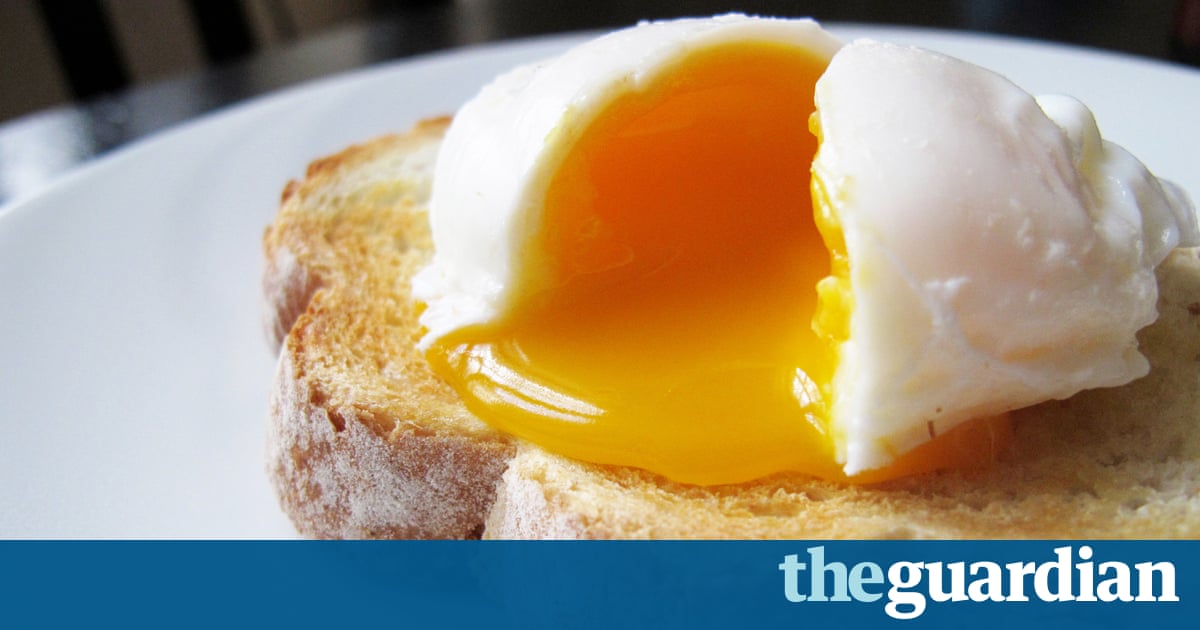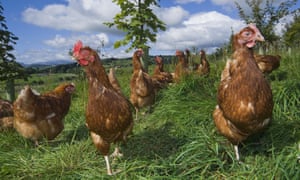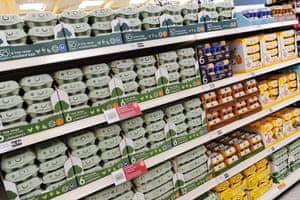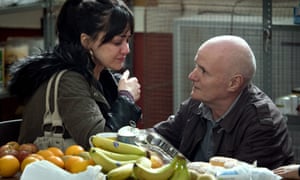
The joy of eggs how ‘nature’s multivitamin’ shook off the scare stories
Decades of dud healthy-eating guidance sent the humble egg into nutritional exile. But with new advice about runny yolks suggesting that salmonella in raw eggs is a thing of the past, its time to lick the cake bowl again

Every morning for breakfast I eat a runny-yolked egg, often boiled, sometimes poached, or fried. In any given week Ill consume eggs in other meals frittata, souffle, as a binder for breadcrumbed fish, in baking, quiche, kedgeree, fresh pasta, perhaps. I reckon that I personally get through anything between 10 and 15 eggs weekly. I do it not only because I cherish their near-magical cooking properties, but also as a two-fingered salute to a dogmatic government dietetic establishment that has pumped taxpayers money into convincing us that this most perfect of natural foods is something we should restrict, even fear. Guess what? Ive maintained a healthy, normal body weight, and lived to tell the tale.
So forgive me if I dont applaud the latest Food Standards Agency (FSA) edict telling us that pregnant women, babies and elderly people can now eat eggs raw or soft-cooked without calamitous consequences, as if this was some sort of thunderbolt revelation, a recent achievement. Its more a case of: Youre 30 years too late guys, but better late than never.

Eventually, after demonising eggs for a quarter of a century or more, the authors of our governments egg script that eggs could clog your arteries and poison you are stealthily dismantling the flashing red lights they have put around this elemental food in the public mind. Now, like offenders participating in restorative justice schemes, we need the civil servants and scientific advisers who unnerved us about eggs to say mea culpa, and reflect on how their adherence to bankrupt healthy eating orthodoxy sent one of natures cleverest food packages into nutritional exile.
Its hard to think of any food that can compete with eggs in overall health terms. They provide us with high-quality protein that contains all nine essential amino acids in the precise proportions required by the body for optimum growth and maintenance. Eggs outperform all other proteins from both animal and plant sources. Protein is the macronutrient that most efficiently satisfies appetite. It also reduces the secretion of ghrelin, the hormone that stimulates hunger. A body of research suggests that eggs might help us stay slim. For instance, one trial found that women who ate eggs for breakfast felt more full and consumed fewer calories for the rest of the day and for the next 36 hours. Thats certainly my experience.

Eggs are often referred to as natures multivitamin pill, with ample justification, because they contain vitamins A, D, E, and a range of B vitamins, in significant amounts. They are also an oval treasure trove of minerals, 10 of them calcium, phosphorus, zinc, selenium, potassium, sodium, copper, iodine, magnesium and iron; and more obscure, but nevertheless vital micronutrients, choline, lecithin, lutein and zeaxanthin. If ever there was a genuine superfood, the egg is it.
And yet many Britons fret about eating eggs because weve been drip-fed fear of this most versatile food, and like biddable citizens, many of us have swallowed it.
For decades, public health gospel was that we should eat no more than two eggs a week. The egg was an early victim of the late 20th-century fixation with cholesterol; yolks contain it. This thinking, progenitor of the supposedly healthier egg white omelette in the US, was that the cholesterol that naturally occurs in food causes heart disease and stroke. It doesnt. Actually, cholesterol is a vital component of cell membranes. Among other things, it heals and repairs the body, supports our cognitive function, and helps our bodies make vitamin D and hormones.
Belatedly, when scientific research made it too embarrassingly apparent that cholesterol in eggs had almost no effect on blood cholesterol profiles, official UK nutritional guidelines were quietly altered. Now NHS Choices says: There is no recommended limit on how many eggs people should eat. But any diligent citizen who pays attention to the governments Eatwell plate its pictorial image of its recommended healthy diet, which is heavily weighted towards processed carbohydrate foods might nevertheless conclude that a bowl of cornflakes is still nutritionally preferable to an egg.

Nutrition apart, the FSAs latest pronouncement is that we can now eat raw or runny Lion-stamped eggs without courting food poisoning. The major reduction in the risk of salmonella in Lion eggs is testament to the work carried out by egg producers. The measures theyve taken, from vaccination of hens through to improving hygiene on farms and better transportation, have dramatically reduced salmonella levels in UK hens, says FSA chairman Heather Hancock. But were eggs really ever a major, or even a minor, source of food poisoning in the UK?
Edwina Currie started the whole salmonella enteritidis and eggs saga in 1988 with one sentence: Most of the egg production in this country, sadly, is now affected with salmonella, triggering either Britains first major food scare, or its first mass-media moral panic over food, depending on how you see it. At that time, egg producers loudly contested her assertion and the putative linkage of eggs with food poisoning, and to this day, many microbiologists agree with them. Dr Richard North, a leading independent food safety consultant who has conducted lab tests on salmonella in eggs, and evaluated 60 salmonella outbreaks in the UK, is a case in point. Only one, or at most two of the outbreaks I studied credibly had egg as a source. He attributes the rise in salmonella food poisoning cases in the late 1980s to two alternative causes. First, a surge of salmonella infection, not in egg-laying hens, but in factory farmed broilers (chickens reared in intensive systems for their meat). Salmonella is one of the recognised diseases of intensification that dog this type of production. Second, North points to the 1980s fashion among food manufacturers, at the supermarkets behest, for a blander, lower-vinegar mayonnaise: Mrs Beetons classic mayonnaise recipe was actively bactericidal.

Contrary to the FSAs line that vaccines dealt with a genuine problem, North maintains that the whole salmonella and eggs debacle was a classic food scare based on myths and dodgy science. And its one of those never-to-be-resolved debates anyway, now that the FSA has given eggs its blessing. Feel free to lick the cake bowl once again. Even Currie now says: If you buy eggs in the UK you can be pretty sure theyre safe.
I buy free-range organic eggs every week from a local producer. I know him by name and can look into his eyes. His eggs dont have the Lion stamp or need it. He has confidence in the cleanliness and safety of his production methods and after years of eating them, so do I. His small flock of grass-fed, free-ranging hens are not kept in close confinement and so are much less susceptible to disease of all sorts. Supermarkets love a nationwide protocol, such as the Lion stamp, to reassure customers of safety, but this doesnt mean that any eggs that dont bear this stamp are risky.
Whichever retrospective interpretation of the salmonella and egg saga you believe, theres no doubt that eggs are more good news these days than bad. Back in Curries time, 92% of hens were kept in cruel battery cages. Nowadays, thanks to concerted campaigning from animal welfare groups, such as Compassion in World Farming, the equivalent figure has almost halved and cages have been marginally improved or enriched with welfare in mind. All the key supermarket chains are pledged to phase out shell eggs from caged hens by 2025. In practical terms, Compassion in World Farming recommends Soil Association-certified organic eggs for the highest welfare they must be free-range and no controversial beak trimming is permitted and failing that, free-range eggs from more traditional breeds of hen, because they are put under less pressure to produce. Caged eggs are still routinely used in food manufacturing and catering, but a growing number of companies, including Unilever, Sodexo and Nestl, have also committed to sourcing only cage-free eggs in their global supply chains, again by 2025.

Its worth noting that the fipronil egg scandal, which broke in August, where imported egg products were contaminated with an insecticide often used as flea killer affected only pre-prepared eggs used in food manufacturing and catering. Cake mixes used by industrial bakeries were withdrawn, along with liquid pasteurised eggs bought by chefs, and pre-cooked, factory-made supermarket convenience foods: certain salads from Asda and Sainsburys, some Morrisons egg sandwiches, and Waitrose deli filler were affected. The moral of the story here is: if there are dodgy eggs to be offloaded, theyre not likely to still be intact in their shells, but pre-processed in some way.
Eggs are definitely poised for a comeback, although it has to be said that throughout all the years that eggs were dispatched to the nutritional wilderness, many people, sceptical about public health advice, never stopped eating them. In the UK we eat on average between three and four eggs a week. In the 1960s, our national average egg consumption was five. But over the past 12 months, retail egg sales have risen by 4%. In the current grim landscape, where more and more citizens need to use food banks just to put a meal on the table, eggs, which are so affordable and offer such unbeatable nutrition and sustenance, never more deserved a place on our plates. Just think of the character of Katie in the film I, Daniel Blake. She surely needed an egg, not a can of sweet baked beans, yet many food banks have no fresh food to offer, often for safety reasons. Similarly, government-stoked worry about safety has deprived whole demographics the elderly, children, people in care homes and hospitals of the pleasure and incomparable nutrition of properly cooked, that is not overcooked, eggs.

Last week in Galway, at the international Food on the Edge chef symposium, South African chef Margot Janse spoke about how her Isabelo charity in Franschhoek now feeds 1,400 disadvantaged pre-school and primary school children every day, often the only healthy meal they receive. She started by giving out home-baked muffins, with mixed results. Some children didnt find them sweet enough. But it was boiled eggs that the kids really loved and that grew full attendance at school. There are lots of hearts of gold that care [about fighting poverty] but an egg also has a heart of gold and is a lot more practical, she concluded.
Whatever your current status starving, peckish, dieting, feasting, economising, working, travelling, convalescing, or just going about your daily business its hard to beat an egg.
